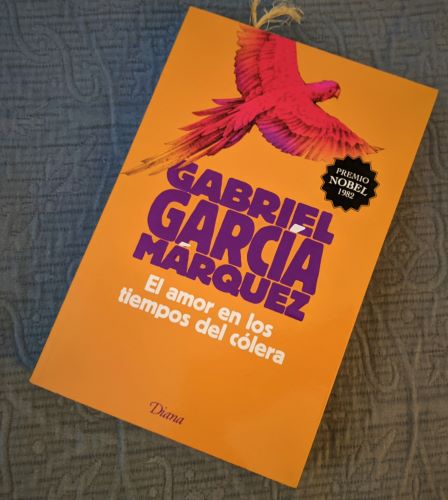I think we can all agree that 2020 was the kind of year that allows us a grace period on just about anything. So it is that I am writing on January 4 about a book I actually finished reading on January 3 and that I’m counting as having finished on December 31.
I trust no one will disagree with my decision. I’ll also add in the fact that the book, El amor en los tiempos de cólera by Gabriel García Márquez, is one that I read in Spanish, and as a non-native speaker that just takes me a heck of a lot longer.
This book is a piece of personal history for me. It was the first one in Spanish I ever purchased during my first visit to México a few years ago. We were at a mall in between a visit to el Museo Soumaya and going to the movies to see Incredibles 2. I remember the look on the bookstore employee’s face, one I’m sure I had many times during my retail career, when we unhelpfully asked her for a recommendation for my first Spanish book while offering no information about what genre I may like.
The end result was me picking this book and then later choosing it to close out my 2020 reading year.
I have to say, for a good part of this story, I was dreading the ending. It follows Florentino Ariza, a man who is enamored with a woman named Fermina Daza from the time they are teenagers and exchanging secret letters, through her rejection of him and into their late adulthood when he shows up the day of Fermina’s husband’s funeral.
Sure, from the outset her marriage was one more of status and convenience and eventual learned intimacy. But it was hard to not feel a little weird about his decades of being so fixated on her he was unable to really hold down any kind of meaningful relationship or do anything but obsess over building himself up to be the kind of successful man he figured he had to be. Not to mention his not infrequent references to the fact that he was waiting for Fermina’s husband to die so he could be happy.
Case in point. Among his many, many lovers over the years, there is one who is described as his most loved of all. She leaves abruptly after being in his life for about six months. After Florentino is described as being “bathed in tears for the pain of goodbyes,” as soon as her boat is beyond the horizon, the memory of Fermina “totally occupies him.”
In another section, Florentino is described as being occupied by the urgency that Fermina’s husband “must die.”
“He had known that he was destined to make a widow happy, and that she would make him happy, and that did not bother him. On the contrary, he was prepared.”
Each of these instances built upon my desire to inhabit this fictional world and advise Florentino that perhaps he should not be so fixated on someone he hasn’t even spoken to in years and years. I hoped beyond hope that something else would happen to derail him, since we find out early in the book that he arrives at the funeral and that Fermina notices him there, in her house.
That is to say, until page 377 out of 380. I admit to being taken in by one single sentence that erased 300 solid pages of wanting very badly for this union to not happen in any way.
“For they had lived together long enough to know that love was always love, anytime and anyplace, but it was more solid the closer it came to death,” García Márquez writes.
As much as the journey was not the healthiest, I can’t argue with two people finding someone like that for the rest of their days.
